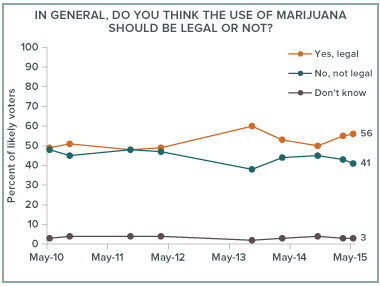 In all likelihood, California voters will be asked to decide the legal status of marijuana on the 2016 ballot. Advocates of legalization are hoping to build on the momentum in four states (Alaska, Colorado, Oregon, and Washington) and the District of Columbia that made the recreational use of marijuana legal. Two national advocacy organizations—the Drug Policy Alliance and the Marijuana Policy Project—have made California a major focus for the 2016 election year.
In all likelihood, California voters will be asked to decide the legal status of marijuana on the 2016 ballot. Advocates of legalization are hoping to build on the momentum in four states (Alaska, Colorado, Oregon, and Washington) and the District of Columbia that made the recreational use of marijuana legal. Two national advocacy organizations—the Drug Policy Alliance and the Marijuana Policy Project—have made California a major focus for the 2016 election year.
Will a legalization initiative pass in California? Our May PPIC survey suggests that support is relatively high among likely voters: 56 percent said that marijuana should be legal. When we first began asking about legalization in May 2010, California voters were sharply divided. While support for marijuana legalization has fluctuated, since March 2014 we have seen an incremental trend toward support for legalization among likely voters. Among likely voters today, majorities of Democrats, independents, younger voters, and parents favor legalization. However, among some key electoral groups—including Latinos, Republicans, and older voters—legalization fails to get majority support. The success of any initiative aimed at legalizing the recreational use of marijuana is likely to depend on whether supporters can make inroads among these groups.
Would marijuana legalization be good public policy? That is an even more difficult question. This week a Blue Ribbon Commission on Marijuana Policy—chaired by Lt. Governor Gavin Newsom—made a series of recommendations to consider in crafting an initiative. The list includes ways to limit children’s access, reduce illegal activity and regulate sales.
Should an initiative pass, a significant degree of implementing legislation and regulation are likely to follow. In short, the devil is in the details.
These details may not only determine whether legalization is good public policy—they may also affect the electoral fortunes of any marijuana legalization initiative on the 2016 ballot. In our March 2015 survey, Republican (51%) and Latino (56%) likely voters were among the most likely to say they would be bothered if a store selling marijuana opened up in their neighborhood. Similarly, in our May 2015 survey, Republican (58%) and Latino (55%) likely voters were among the most likely to say that they are very concerned about more underage people trying marijuana if it were made legal. The details of regulation and implementation are likely to play an important role in addressing some of these voters’ concerns.
In the coming months, PPIC plans to contribute to the discussion surrounding the legal status of marijuana in the state. As always, our aim will be to provide essential information and help frame the debate. By identifying some of the key issues the state will have to address, we hope to help policymakers—and, ultimately, the voters—improve California’s marijuana policies.

